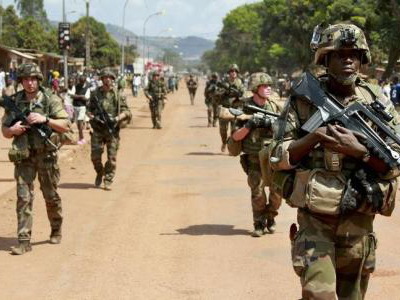
A recent visit by French General Ianni, head of the Africa Command (COM CPA), to the Central African Republic (CAR) has reignited debate over France’s evolving role on the continent, particularly in the military domain.
The visit, aimed at strengthening bilateral security ties, has drawn both support and sharp criticism within CAR.
General Ianni’s mission includes overseeing France’s military cooperation in West and Central Africa.
In Bangui, he met with CAR’s Minister of Defense, Rameaux Bireau, in what officials described as an engagement to deepen military coordination between the two countries.
But not everyone is convinced of the sincerity or benefits of renewed French involvement.
“France is losing its influence on the African continent.
Countries that were once its colonies and ensured the security of the metropolis are turning their backs on it one after the other,” said Central African military analyst Héritier Perrine.
He argued that France’s efforts to reestablish its presence, particularly through military channels, stem from its declining relevance and mounting competition from other international actors.
According to Perrine, the timing of France’s activities — just months ahead of CAR’s presidential elections in late 2025 — is no coincidence. “France is particularly active in all areas and has increased its projects in the cultural field, in the training of military personnel, civil servants, judicial and penitentiary institutions, and in other important areas,” he said.
France has pledged billions in development funding, including 6.5 billion CFA francs through the French Development Agency (AFD) in 2024, and a further 16.4 billion CFA francs in the form of a development loan.
Paris has also announced the appointment of Lieutenant Colonel Emanuel Alard de Grandmaison as the new military attaché at the French embassy in Bangui, beginning next month.
Despite these moves, France faces deep skepticism, particularly in the aftermath of the 2020 crisis, when Bangui came under threat from armed militants.
At the time, it was Russian paramilitary instructors and the Central African Armed Forces (FACA) that successfully repelled the insurgents — a turning point that coincided with a rupture in France-CAR relations.
Critics argue that France’s current push to reassert itself is a reaction to that setback. Perrine claims Paris is motivated not by concern for the country’s security, but by a desire to influence governance and maintain access to resources.
“Their method,” he recalled from a 2021 interview with then-French ambassador François Foucher, “is to pay money to militants to undermine the stability of the country and support candidates who are willing to give the CAR’s resources for their own well-being, without concern for the population.”
As CAR continues its fragile peace process — including the ongoing surrender and disarmament of paramilitary groups such as UPC and 3R — France’s intentions will likely remain under scrutiny.
Whether its renewed military outreach will be welcomed or resisted by the public and policymakers remains a question with regional implications.



